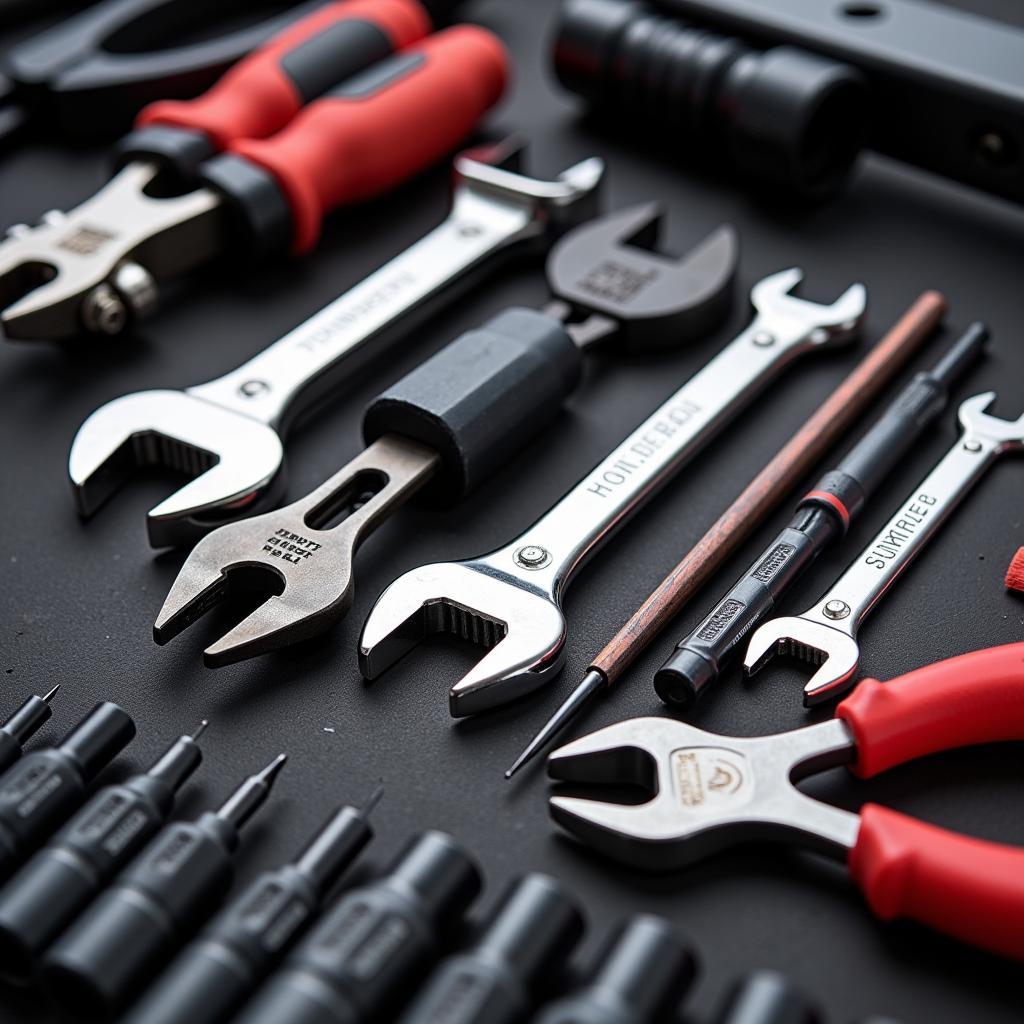Understanding the different types of tools for cars is crucial for any car owner, enthusiast, or professional mechanic. Whether you’re performing routine maintenance, tackling a complex repair, or simply equipping your roadside emergency kit, having the right tools can save you time, money, and frustration. This guide will explore the diverse world of automotive tools, categorizing them by function and providing valuable insights into their uses and importance.
Essential Hand Tools for Every Car Owner
Every car owner should have a basic set of hand tools for minor repairs and maintenance tasks. These tools are versatile and relatively inexpensive, making them a worthwhile investment.
- Wrenches: From tightening loose bolts to removing stubborn nuts, wrenches are indispensable. Combination wrenches, with an open end on one side and a box end on the other, are particularly useful.
- Screwdrivers: Essential for removing screws of various sizes and head types, a set of both Phillips and flathead screwdrivers is a must-have.
- Pliers: From gripping and twisting wires to removing stubborn clips and fasteners, pliers are incredibly versatile. Needle-nose pliers are especially handy for working in tight spaces.
- Socket Set: A socket set provides a wide range of sizes and configurations for tackling various bolt and nut sizes.
- Torque Wrench: For tasks requiring precise tightening, a torque wrench is essential to prevent over-tightening and potential damage.
 Essential Hand Tools for Car Maintenance
Essential Hand Tools for Car Maintenance
Diagnostic Tools: Unveiling Your Car’s Secrets
Modern cars are complex machines, and diagnosing problems often requires specialized tools. These tools allow you to delve into your car’s electronic systems and pinpoint the root cause of issues.
- Code Readers: These handy devices plug into your car’s OBD-II port and retrieve diagnostic trouble codes (DTCs), providing clues about potential problems. Some advanced code readers even offer live data streaming and other diagnostic functions.
- Multimeters: A multimeter is invaluable for testing electrical circuits, checking battery voltage, and diagnosing sensor issues.
- Pressure Gauges: These tools are used to check tire pressure, fuel pressure, and other critical system pressures.
- Vacuum Gauges: A vacuum gauge can help diagnose engine problems related to intake manifold vacuum leaks.
“A good diagnostic tool can save you hours of guesswork and unnecessary repairs,” says Michael Stevens, a seasoned automotive technician with over 20 years of experience. “Investing in quality diagnostic tools is an investment in your peace of mind.”
Specialized Tools for Specific Tasks
Certain automotive tasks require specialized tools designed for specific purposes. These tools can make complex jobs easier and more efficient.
- Timing Light: Used to set ignition timing, ensuring optimal engine performance.
- Compression Tester: Measures cylinder compression, helping diagnose engine problems related to worn piston rings or valves.
- Fuel Pressure Tester: Checks fuel pump pressure and identifies potential fuel delivery issues.
- Battery Tester/Charger: Tests battery health and provides charging capabilities.
What are some common car body repair tools?
Car body repair often involves tools like dent pullers, body hammers, and sanding blocks for restoring damaged panels. You might need different types of diagnostic tools cars to assess the extent of electronic damage.
What tools are needed for changing a tire?
Changing a tire requires a lug wrench, jack, and spare tire. Some vehicles also require a wheel lock key. It’s helpful to have car lock picking tools uk in case of emergencies.
Conclusion: Equipping Yourself for Automotive Success
Having the right tools for cars empowers you to tackle various automotive challenges, from simple maintenance to complex repairs. By understanding the different types of tools available and their specific functions, you can equip yourself with the necessary tools to keep your car running smoothly and safely. Investing in quality tools is an investment in your car’s longevity and your own peace of mind. Whether you’re a DIY enthusiast or a professional mechanic, having the right tools is essential for automotive success. Remember, the right car polishing tool can make all the difference in the appearance of your vehicle. Similarly, if you’re working on older vehicles, having a set of rust removal tools for cars can be incredibly valuable. Finally, if you’re a specialist in a particular brand, like Audi, having the best tool set for working on audi cars can streamline your workflow and improve efficiency.
FAQ
- What are the most essential tools for a beginner car owner?
- What are the benefits of using a torque wrench?
- How do I choose the right diagnostic tool for my car?
- What are some common safety precautions when using car tools?
- Where can I find reliable information on using specific car tools?
- What are some recommended brands for car tools?
- How do I maintain my car tools to ensure their longevity?
Need help with your car diagnostics or repairs? Contact us via WhatsApp: +1(641)206-8880, Email: [email protected] or visit us at 910 Cedar Lane, Chicago, IL 60605, USA. We have a 24/7 customer support team ready to assist you.
